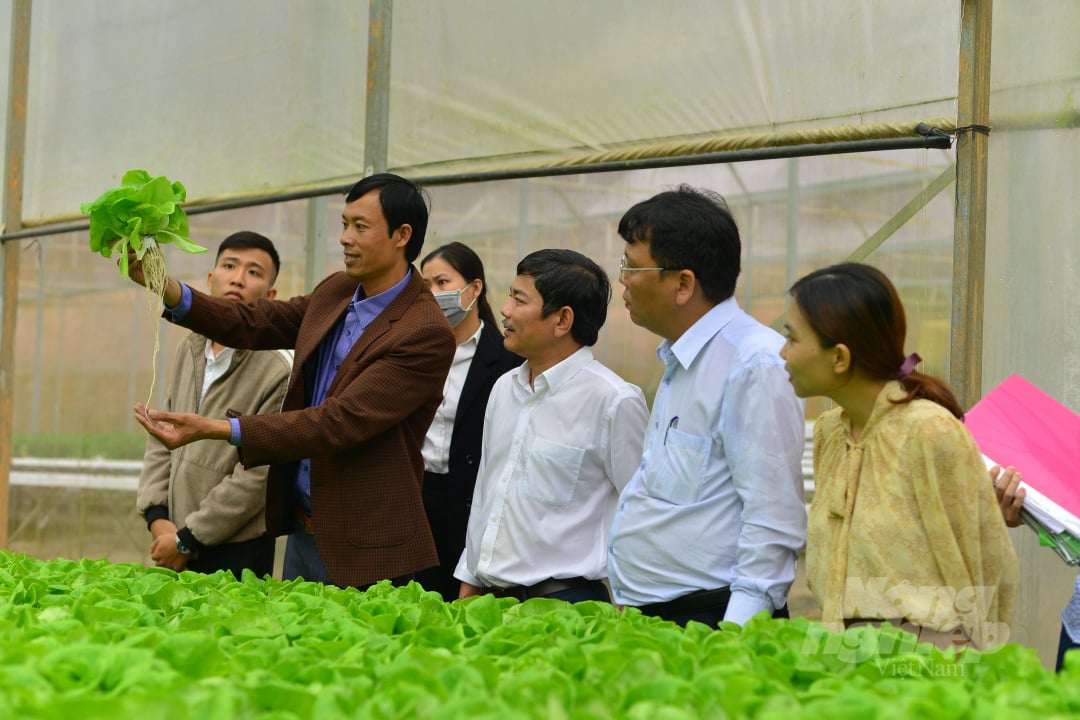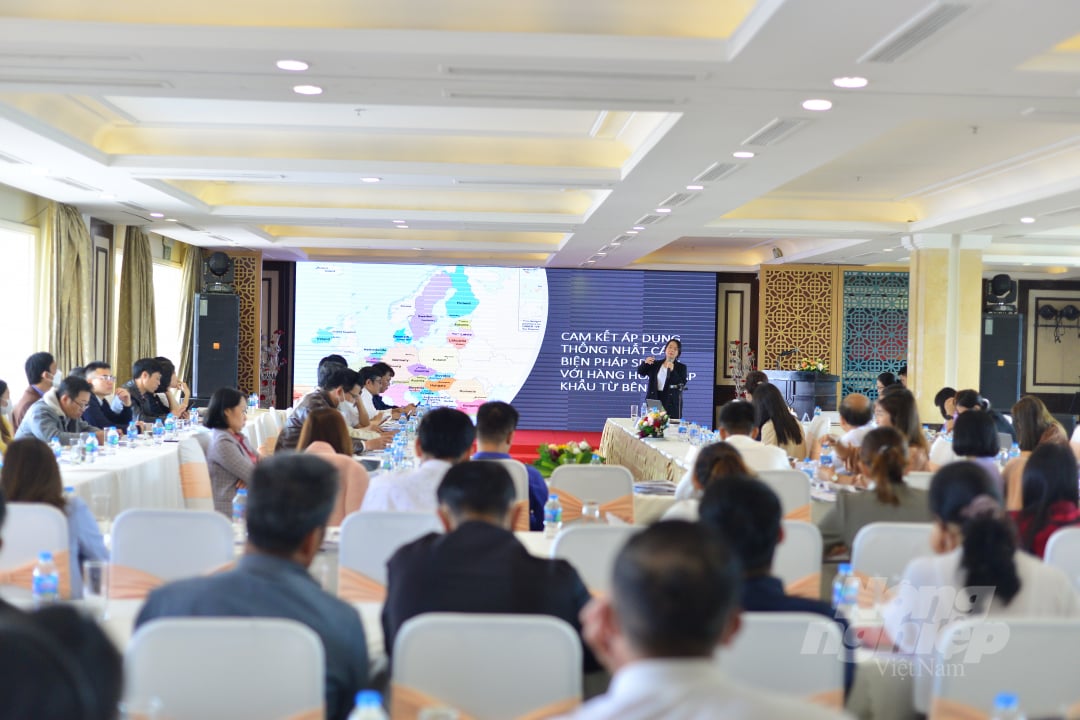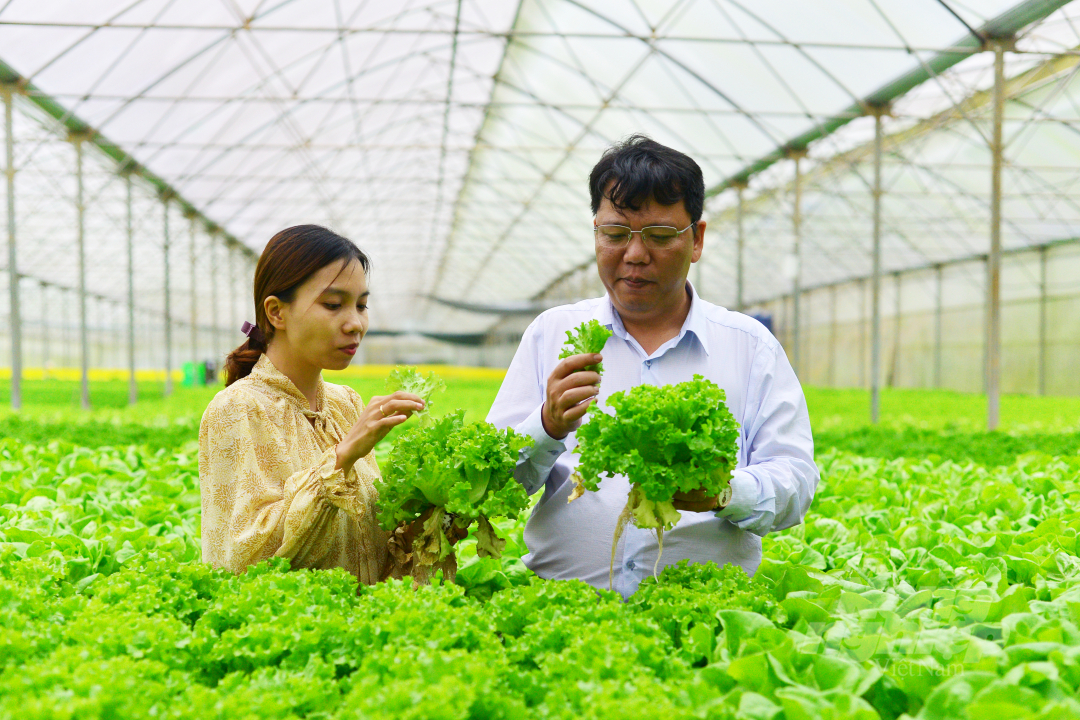November 28, 2025 | 05:38 GMT +7
November 28, 2025 | 05:38 GMT +7
Hotline: 0913.378.918
November 28, 2025 | 05:38 GMT +7
Hotline: 0913.378.918
Dr. Ngo Xuan Nam, Deputy Director of Vietnam SPS Office, said, “Over the past 15 years, Vietnam has had many changes, especially in the field of agro-product exports to major markets such as the EU, the USA, and the China market.
Particularly in the last three years, the requirements and regulations on food safety, disease safety as well as regulations on origin, packaging, labels, and product quality have always received keen attention and strict management.

Vietnam SPS Office organized a training session, and visited a model of hydroponic vegetables for export in Truong Phuc Farm Company Limited (Lac Duong district, Lam Dong). Photo: Minh Hau.
"According to statistics from Vietnam SPS Office, every year WTO member countries announce approximately 1,000 changes in sanitary and phytosanitary (SPS) measures. The office receives hundreds of information about these changes. Therefore, when we produce to meet the market demand, we need to read the signs of the market. We have to know where they are making the changes. This is a very important matter," said Dr. Nam.
Regarding this issue, Mr. To Quang Dung, CEO of Truong Phuc Farm Company Limited (Da Lat, Lam Dong), said, "The market is constantly changing, but we have a lot of difficulties in accessing information. We used to take a lot of time to bring products into the Korean market and had to collect information from many different sources."
Mr. To Quang Dung added that businesses need support from Vietnam SPS Office in order to grasp information as soon as possible and further expand the market in the near future. The company was currently looking for opportunities to penetrate the markets of Japan, Singapore, China and other countries.

On June 2 in Lam Dong province, Vietnam SPS Office held a conference to disseminate regulations and commitments on SPS in the EVFTA. Photo: Minh Hau.
Meanwhile, Mr. Phan Van Tan, Deputy Director of the Department of Agriculture and Rural Development of Binh Thuan province, raised the reality of Binh Thuan province's production and consumption of dragon fruit which remained full of problems. “Agricultural products have many opportunities in the EU and China markets, but they are increasingly tight on food safety and other issues. It is thus essential for the whole political system to join in and to reorganize production to meet market requirements.”
To solve matters, Vietnam SPS Office has gathered speakers, experts, and research institutes to update and provide information. Enterprises' problems such as production organization, factory, farm, and printing product codes according to regulations have also been updated and disseminated.

Dr. Ngo Xuan Nam, Deputy Director of Vietnam SPS Office trying clean vegetables in Truong Phuc Farm Company Limited’s hydroponic vegetable garden. Photo: Minh Hau.
Concerning planting area codes and pesticides, the SPS Office also received news from producers and businesses, worked with local authorities, exchanged information with foreign regulatory agencies, and responded to the questions of manufacturers and businesses.
“Vietnam SPS Office recommends that businesses acquire information about food safety measures as well as animal and plant diseases from official sources,” Dr. Ngo Xuan Nam said.
SPS measures are currently mandatory and only the negotiating government agency is the official source of information. According to WTO regulations, each country entering WTO will have to establish a focal point for SPS information. In the case of Vietnam, it is the Vietnam SPS Office. Therefore, businesses must pay attention to avoid unchecked information.
"We will soon submit to the Prime Minister the Scheme “Improving free trade agreements implementation capacity” and ask for approval. The scheme’s contents include building the SPS information portal and strengthening the SPS system. This will help localities collect information more easily - an innovation to update market information," said Dr. Ngo Xuan Nam.
MSc. Tran Thuy Dung, Plant Protection Department (MARD) had some recommendations for businesses and related parties concerning SPS information:
Update knowledge about new-generation Free Trade Agreements, make full use of non-tariff advantages, and gain further insight into matters concerning SPS regulations;
Guarantee to secure requirements concerning rules of origin;
Focus on quality and meet the standards set by relevant international organizations on growing area codes, protection of geographical indications, packaging, labels, agricultural product processing technology and quarantine procedures.
Translated by Samuel Pham

(VAN) China’s cooking oil is suddenly flooding into India. It all comes down to a soybean surplus that Beijing doesn’t quite know what to do with.

(VAN) An Giang promotes supply-demand connections, standardizes quality and builds value chains, creating a foundation for sustainable bird’s nest development and aiming to expand exports.
/2025/11/24/5339-4-nongnghiep-075331.jpg)
(VAN) Recently, the conference on 'Sustainable Fisheries Linkage Chain - Tilapia for Export' took place in Tien Hai commune, Hung Yen province.
/2025/11/21/4309-2-153400_128.jpg)
(VAN) Green and low-emission rice is paving the way for Vietnamese rice to enter high-end markets, marking the beginning of a transformation journey toward greening and elevating the national rice brand.

(VAN) ‘Right to Win’ outlines a national action plan that shapes a new vision for Viet Nam’s agriculture in an era of renewal and global integration.

(VAN) Lam Dong’s farmed sturgeon output this year is expected to reach 2,300 tons, worth VND 450 billion, affirming the brand’s position on the market.

(VAN) A surge in Ukrainian egg exports, largely driven by soaring sales to the UK over the last few years, has notably pushed up egg prices on the domestic market.